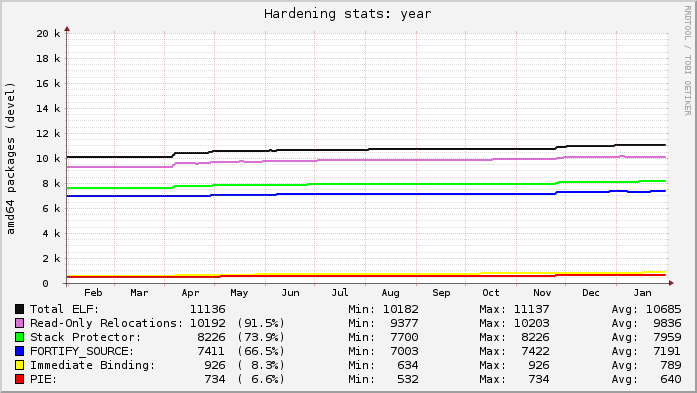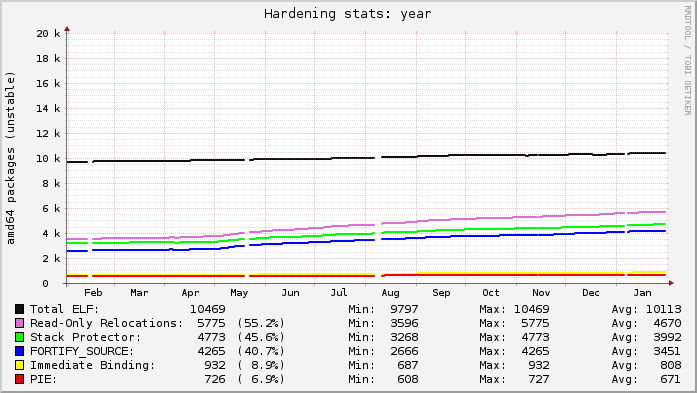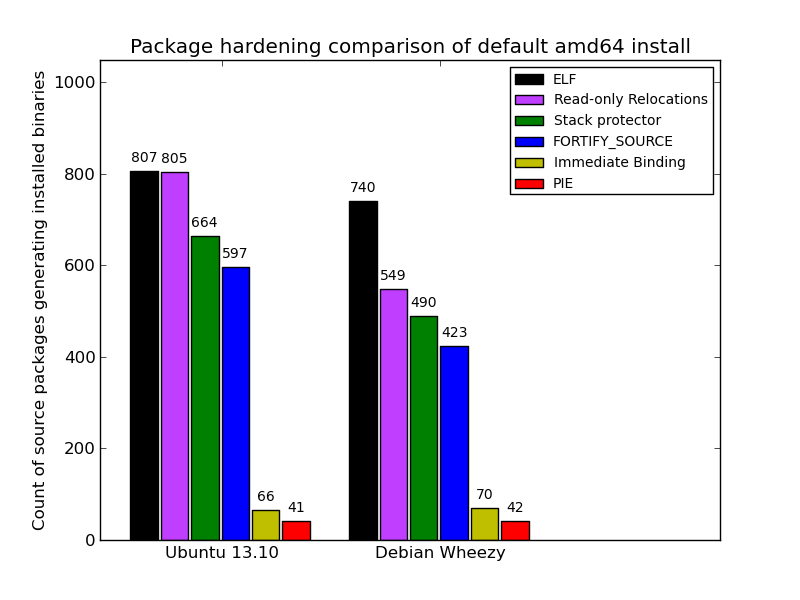

Photo by Aigars Mahinovs
I followed Gregor s evolution within Debian because I used to be somewhat active in the Perl team. His case is exemplar because it shows that you don t need to be an IT professional to join Debian and to make a difference. His
QA page is impressive with hundreds of packages maintained and hundreds of non-maintainer uploads too.
While he started out slowly, I remember meeting him at Debconf 7 in Edinburgh and after that he really got more implicated. Again a case of someone joining for technical reasons but getting more involved and staying there for social reasons!

Let s jump into the interview and learn more about him.
Raphael: Who are you?
Gregor: I m 41 years old, and I live in Innsbruck, Austria, in a
shared apartment with a friend of mine. In my day job, I m working at the
regional addiction prevention agency, so I m one of the few Debian guys
who s not an IT student or professional. I started maintaining packages in
2006, and I am a DD since April 2008.
Raphael: How did you start contributing to Debian?
Gregor: After having used Debian on servers for some years, I finally switched to it
on the desktop after some procrastinating. Soon afterwards I wanted to know
more about the making-of , started to join mailing lists, filed bugs, and
tried to learn packaging.
Luckily I quickly found a permanent sponsor Tony Mancill, and we re still
co-maintaining each others packages. And when I packaged my first Perl
modules, Gunnar Wolf
invited me to join the
Debian Perl Group, an offer I
accepted a few days later. And I m still there

Later, the NM process, although it involved some waiting times, was also a
good learning experience due to my AM Wouter Verhelst. (And in the meantime
the organization of the NM process has vastly improved, from what I hear.)
So my starting point for joining Debian was my curiosity
but what really helped me to find my way into the project was the
support of the people who invited and helped me.
Raphael: What s your biggest achievement within Debian or Ubuntu?
Gregor: I m not sure I can name a single big achievement but I guess I can say that
my contributions to the
Debian Perl Group have helped to make and
keep the team a success story.
Raphael: The pkg-perl team seems to work very well. As an active member,
can you explain us how it is organized? How do you explain its success?
In particular it seems to be a great entry point for new contributors.
Gregor: The team is huge, both in numbers of members and packages (over 2200). Since
last DebConf we manage our source packages in git, we have 2 mailing lists
and an IRC channel, and we manage to keep an overview by using
PET, the Package
Entropy Tracker.
It s true that we get new members on a regular basis; we try to invite people
(like it happened to me 6 years ago

) but there are also quite a few new
contributors who find our docs and introduce themselves on the mailing list.
Maybe someone should conduct a study and ask them what motivated them to
join.

We hand out group membership/commit access quickly, and we try to mentor new
contributors actively during their early times in the group. Some of them
leave for other projects after some time, but many also
stay and become DDs later.
I m not sure what the reasons for the group s success are, maybe a
combination of:
- a culture in the group (and also in the upstream Perl
community) that s based on fun, cooperation, and respect;
- the fact that packaging Perl modules is most of the time quite
easy;
- a great set of tools, and also (hopefully) useful
documentation;
- a bunch of relaxed people who are open to newcomers and try to
help each other.
For everyone interested in joining the Debian Perl Group,
our
Welcome
page on the wiki is a good starting point.
Raphael: What are your plans for Debian Wheezy?
Gregor: Nothing overly exciting. What I should do is getting a newer
JabRef into Debian (which involves packaging some new Java
libraries any takers?).
A solution for libdatetime-timezone-perl (which ships
timezone data converted to Perl modules and tends to get outdated when the
timezone data change) would be nice; let s see if
#660404 leads to some results
And some Perl packages will also need a bit of work for the
hardening build flags release goal (cf.
#657853).
Raphael: What s the biggest problem of Debian?
Gregor: Inertia. While I really like the fact that Debian is a
volunteer project, and that every contributor works when and on what they
decide to work on, I get the feeling that Debian could do better in moving
forward, innovating, taking decisions.
I also think that more uniformity in managing source
packages would make things easier; it s quite amazing to see how many source
formats, packaging helpers, patch systems, RCSs etc. are used all over the
archive. I m not advocating for mono-cultures, and I consider this diversity
a strength in general, but having to find out first how this particular
package works when preparing a bug fix can be annoying.
On the bright side, I think that the myth Debian and its mailing lists are
mostly about flames can be seen as dispelled in the meantime. Sure,
sometimes the tone could be a bit more civil, but in general most of the
interactions I ve seen in the last years were friendly and helpful. IMO, the
Debian Project consists of mostly nice and cooperative
people, and that s what makes it fun for me.
Raphael: You re one of the most dedicated participants to
RCBW (Release
Critical Bugs of the Week), an initiative to fix RC bugs every week.
How much time do you spend on it? What would you advise
to people who are considering to join the movement?
Gregor: I got into the habit of fixing RC bugs after having been invited to my first
Bug Squashing Party in Munich some years ago. During this
weekend I saw that fixing RC bugs can be fun, is often not that difficult,
and gives a warm fuzzy feeling

I can definitely recommend attending a BSP
if one happens to be organized near you.
After tasting blood at this first BSP I tried to continue looking at RC
bugs, and I guess I spend something around half an hour per day on it. I
usually
blog about it once a
week, in order to motivate others to join in.
And joining is easy: just take a look at the tips people like
Zack,
Vorlon, or
me have
written. You don t have to be a DD to help, many of my NMUs are based on
patches that others kindly prepare and send to the BTS kudos!
Another nice aspect is that the
RC
bug list contains problems from different fields: general packaging
problems, language-specific issues, policy violations, etc. So there s
something for everybody, and you don t have to be an expert in all fields to
fix a specific bug.
What s rewarding about fixing RC bugs is not only the feeling of
accomplishment and the knowledge about having helped the next release I
also received quite a few Thank you mails from
maintainers who were busy at that time and appreciated the help.
Raphael: Do you have wishes for Debian Wheezy?
Gregor: Well, there s not so much left of the Wheezy release cycle if we manage to
freeze in June

Some quick thoughts for Wheezy and Wheezy+1:
- Obviously, getting multi-arch and the hardening build flags as far as
possible would be good.
- What I like is the idea of the time-based freeze, and I hope it will
work out in June. And then I hope that the freeze will be shorter this time
than during the last 2 releases.
- Unless I m missing something, the CUT discussions have more or less died
down; IMO that s a pity because there are users who run testing and would
like to avoid the several month long freeze. Maybe someone can come up with
new ideas for Wheezy+1
- Too late for broad adoption in Wheezy but still: What constantly annoys
me is the handling of conffiles during upgrades (when I want to keep changed
values but at the same time want to add new variables).
Config::Model seems
to be the best idea so far for
configuration upgrades but it s not yet widely adopted.
Raphael: Is there someone in Debian that you admire for their contributions?
Gregor: There are many people in Debian I admire, too many to name them all. The
first one that comes to my mind is Russ Allbery who not only does great work
from lintian to Debian policy but who also sets a great example of
communicating in a perfectly polite and respectful way even in heated
discussions.
Thank you to Gregor for the time spent answering my questions. I hope you enjoyed reading his answers as I did. Note that older interviews are indexed on
wiki.debian.org/PeopleBehindDebian.
Subscribe to my newsletter to get my monthly summary of the Debian/Ubuntu news and to not miss further interviews. You can also follow along on Identi.ca, Google+, Twitter and Facebook.
2 comments Liked this article? Click here. My blog is Flattr-enabled.
 I don't often write on this blog, and when I do, it's either tech related,
or light life stuff.
Over the next few weeks, it's going to get a lot more political. If you
currently follow this blog for its technical content, you may be tempted to
tune out. I would encourage you to stay and listen. I'm passionate about
the technology that I work on; but the greatest problems facing our world
today are not ones that will be solved with software.
American democracy is in bad shape, and it's because of what we're doing to
it. This is not a problem of the Right or of the Left; it is not a problem
that began with the election of Donald Trump, and it's not a problem that
will go away at the end of his term. It is partly a structural problem with
the way our elections work, but more than that it's a problem of how we're
splitting into separate tribes, isolating ourselves from those who don't
agree with us.
As Russ Allbery
wrote the morning after the election, everything about how we organize
ourselves online today - and how we let Facebook and Twitter organize us -
leads us to surround ourselves with people who already think the same way we
do. That leaves all of us with huge blind spots for other people in our
country, and it stifles the free exchange of ideas that is so essential for
a healthy democracy. We need leaders who will work to make America a better
and more just place for all our neighbors, not just a two-party system
that plays tug-of-war using two different sets of voters that feel shut out.
And the way we organize ourselves today (online and off) does not let us
recognize those leaders.
There's a lot of talk now about Facebook changing how it decides what to
show people; and maybe they can manage to help everyone's online experience
be a little less of a bubble. But part of the change needs to come from us.
We need to be willing to engage, civilly, with people whose perspective is
different from ours, and make the effort to understand where the other is
coming from.
So for the next few weeks, I'm going to talk. And I'm going to listen.
I have no unique qualifications to speak about the country's issues. But I
do have a perspective of my own, which might be different enough from yours
to be useful. I was born and raised in Iowa, and graduated from college
there. This election cycle, I learned that Iowa holds the distinction of
being the state with the lowest percentage of college-educated whites. I'm
part of that statistic, because a few years after graduating I moved to
Portland, Oregon - a place that's notoriously so far to the left of what we
think of as the middle, that it actually has anarchists who would
shamefully use a peaceful protest as cover to commit property
crime.
So I know a few things about the people in each state, that I think the
other should hear.
I'm also that rarest of creatures, a Portlander who goes to church
(Catholic). But I still choose as my neighbors the weird, wonderful, and
welcoming community that we have here, whatever Glenn
Beck might think.
I have a son, and I worry about what kind of world he'll grow up to live in.
I work in software, which means I'm doing a lot better than a lot of people
in the country right now; it also means that from where I sit, I see trends
already in progress that will have an effect on the working class and the
middle class that makes NAFTA look like a gnat's fart in comparison. And so
I worry for what kind of world we will all live in, if we don't make some
changes fast.
Let's have a conversation. No comments enabled on this blog, but you can
find me on G+ or on
Facebook.
I don't often write on this blog, and when I do, it's either tech related,
or light life stuff.
Over the next few weeks, it's going to get a lot more political. If you
currently follow this blog for its technical content, you may be tempted to
tune out. I would encourage you to stay and listen. I'm passionate about
the technology that I work on; but the greatest problems facing our world
today are not ones that will be solved with software.
American democracy is in bad shape, and it's because of what we're doing to
it. This is not a problem of the Right or of the Left; it is not a problem
that began with the election of Donald Trump, and it's not a problem that
will go away at the end of his term. It is partly a structural problem with
the way our elections work, but more than that it's a problem of how we're
splitting into separate tribes, isolating ourselves from those who don't
agree with us.
As Russ Allbery
wrote the morning after the election, everything about how we organize
ourselves online today - and how we let Facebook and Twitter organize us -
leads us to surround ourselves with people who already think the same way we
do. That leaves all of us with huge blind spots for other people in our
country, and it stifles the free exchange of ideas that is so essential for
a healthy democracy. We need leaders who will work to make America a better
and more just place for all our neighbors, not just a two-party system
that plays tug-of-war using two different sets of voters that feel shut out.
And the way we organize ourselves today (online and off) does not let us
recognize those leaders.
There's a lot of talk now about Facebook changing how it decides what to
show people; and maybe they can manage to help everyone's online experience
be a little less of a bubble. But part of the change needs to come from us.
We need to be willing to engage, civilly, with people whose perspective is
different from ours, and make the effort to understand where the other is
coming from.
So for the next few weeks, I'm going to talk. And I'm going to listen.
I have no unique qualifications to speak about the country's issues. But I
do have a perspective of my own, which might be different enough from yours
to be useful. I was born and raised in Iowa, and graduated from college
there. This election cycle, I learned that Iowa holds the distinction of
being the state with the lowest percentage of college-educated whites. I'm
part of that statistic, because a few years after graduating I moved to
Portland, Oregon - a place that's notoriously so far to the left of what we
think of as the middle, that it actually has anarchists who would
shamefully use a peaceful protest as cover to commit property
crime.
So I know a few things about the people in each state, that I think the
other should hear.
I'm also that rarest of creatures, a Portlander who goes to church
(Catholic). But I still choose as my neighbors the weird, wonderful, and
welcoming community that we have here, whatever Glenn
Beck might think.
I have a son, and I worry about what kind of world he'll grow up to live in.
I work in software, which means I'm doing a lot better than a lot of people
in the country right now; it also means that from where I sit, I see trends
already in progress that will have an effect on the working class and the
middle class that makes NAFTA look like a gnat's fart in comparison. And so
I worry for what kind of world we will all live in, if we don't make some
changes fast.
Let's have a conversation. No comments enabled on this blog, but you can
find me on G+ or on
Facebook.
 Back in 2006, the compiler in Ubuntu was
Back in 2006, the compiler in Ubuntu was  Here s today s snapshot of Debian s unstable archive for the past year (at the start of May you can see the archive unfreezing after the Wheezy release; the gaps were my analysis tool failing):
Here s today s snapshot of Debian s unstable archive for the past year (at the start of May you can see the archive unfreezing after the Wheezy release; the gaps were my analysis tool failing): Ubuntu s lines are relatively flat because everything that can be built with hardening already is. Debian s graph is on a slow upward trend as more packages get migrated to dh to gain knowledge of the global flags.
Each line in the graphs represents the count of source packages that contain binary packages that have at least 1 hit for a given category. ELF is just that: a source package that ultimately produces at least 1 binary package with at least 1 ELF binary in it (i.e. produces a compiled output). The Read-only Relocations ( relro ) hardening feature is almost always done for an ELF, excepting uncommon situations. As a result, the count of ELF and relro are close on Ubuntu. In fact, examining relro is a good indication of whether or not a source package got built with hardening of any kind. So, in Ubuntu, 91.5% of the archive is built with hardening, with Debian at 55.2%.
The stack protector and fortify source features depend on characteristics of the source itself, and may not always be present in package s binaries even when hardening is enabled for the build (e.g. no functions got selected for stack protection, or no fortified glibc functions were used). Really these lines mostly indicate the count of packages that have a sufficiently high level of complexity that would trigger such protections.
The PIE and immediate binding ( bind_now ) features are specifically enabled by a package maintainer. PIE can have a noticeable performance impact on CPU-register-starved architectures like i386 (ia32), so it is neither patched on in Ubuntu, nor part of the default flags in Debian. (And bind_now doesn t make much sense without PIE, so they usually go together.) It s worth noting, however, that it probably should be the default on amd64 (x86_64), which has plenty of available registers.
Here is a comparison of default installed packages between the most recent stable releases of Ubuntu (
Ubuntu s lines are relatively flat because everything that can be built with hardening already is. Debian s graph is on a slow upward trend as more packages get migrated to dh to gain knowledge of the global flags.
Each line in the graphs represents the count of source packages that contain binary packages that have at least 1 hit for a given category. ELF is just that: a source package that ultimately produces at least 1 binary package with at least 1 ELF binary in it (i.e. produces a compiled output). The Read-only Relocations ( relro ) hardening feature is almost always done for an ELF, excepting uncommon situations. As a result, the count of ELF and relro are close on Ubuntu. In fact, examining relro is a good indication of whether or not a source package got built with hardening of any kind. So, in Ubuntu, 91.5% of the archive is built with hardening, with Debian at 55.2%.
The stack protector and fortify source features depend on characteristics of the source itself, and may not always be present in package s binaries even when hardening is enabled for the build (e.g. no functions got selected for stack protection, or no fortified glibc functions were used). Really these lines mostly indicate the count of packages that have a sufficiently high level of complexity that would trigger such protections.
The PIE and immediate binding ( bind_now ) features are specifically enabled by a package maintainer. PIE can have a noticeable performance impact on CPU-register-starved architectures like i386 (ia32), so it is neither patched on in Ubuntu, nor part of the default flags in Debian. (And bind_now doesn t make much sense without PIE, so they usually go together.) It s worth noting, however, that it probably should be the default on amd64 (x86_64), which has plenty of available registers.
Here is a comparison of default installed packages between the most recent stable releases of Ubuntu (

 According to the German news page
According to the German news page 

